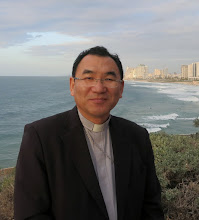May 9, 2016
Caritas Solidarity Conference in Nepal
It was on 25 April, 2015 when Nepal was hit by magnitude 7.8 earthquake which took over 8,000 people's life and injured over 20,000.
Immediately after the disaster, Caritas Nepal together with Caritas Internationalis started relief activities under complex political situation and geographical hardships. One of the member organisation of Caritas confederation, Caritas Australia has been asked to accompany Caritas Nepal while others such as CAFOD from England/Wales, CRS from the US and many other Caritas member organisation have been involved in the operation. Caritas Japan is also contributing financially to the operation.
To commemorate the first anniversary of the disaster and evaluate Caritas response, a conference was organised by Caritas Nepal from 25 to 27 in Dulikhel, outskirt of the capital, Kathmandu.
More than 60 participants were welcomed by Bishop Paul Simick, Apostolic Vicar of Nepal, and Fr. Silas Bogati, the executive director of Caritas Nepal and vicar General of the Vicariate who has been working with Caritas for a long time.
Other participants included Cardinal Tagle, President of Caritas Internationalis, Archbishop Pennacchio, Apostolic Nuncio to India and Nepal, Bishop Stasiuk, Deputy Chair of Caritas Australia, Bishop Rawsthorne, former CAFOD chair and many more from Caritas member organisations.
Though Catholic Church is absolute minority in Nepal; with only seven thousand Catholics (by the way it is just the same as my diocese, Niigata), it seems that its charitable activities through Caritas Nepal has been highly appreciated by the national government. Minister of Culture, Tourism and Civil Aviation, Mr. Aananda Pokharel was present at the beginning of this 3 day solidarity event to congratulate and show appreciation to the Caritas activities and to Catholic Church. It seems that Caritas Nepal and other Caritas member organisations working together with Caritas Nepal after the disaster are well appreciated by local authorities and created good relationship with them.
Based on our experience of disaster in Japan and also on my own encounter with so many victims of natural disaster in different
countries, it is obvious that it will take quite a long time for victims to recover normal life as before the disaster both in rich and developed countries and in poor and underdeveloped countries.
Materially speaking, people in rich countries such as Japan have advantage in receiving relief goods without much delay and in abundance. However it does not mean victims in rich countries have advantage in psychological compensation because, in many cases in rich countries, human relationship in local community has been lost in individualism or local community itself is not so much in function any more far before the disaster.
As one of the program for the 3-day event, we visited one of the hard hit area in Nepal. The village I visited was called Balthali with nearly 190 houses severely hit by earthquake. After one year of the disaster, people are still living in shelters unable to reconstruct their houses. Compare with those shelters in Japan, victims in Nepal are to live in really bad situation. However, people had not lost their hope for future. Though they have been facing terrible difficulties and delay of official assistance, they are confident to rebuild their life in due time. It is only from my guess
but these confidence for future in Nepal is coming from sense of security and mutual support by relationship within the local community. In any case I am really amazed by the resilience of the earthquake affected people in Nepal.
Registration of victims by government to receive necessary financial assistance to rebuild their houses are still going on after one year. Caritas with other NGOs are working with local authority to set up enrollment center to assist local people to prepare documents for registration and also to provide information on earthquake resistant building plan.
There are NGOs or other official agencies with full of skills to provide
immediate relief goods after the disaster. Though Caritas might be one of them, Caritas is characterized by its long term commitment to the people long after the disaster. It is because the Church is always there with people and our charitable activities are based on the very characteristics of being Church.
Subscribe to:
Post Comments (Atom)










Patanjali Yog Peeth Nepal trust and his group begin attempting to nepal earthquake help mission and gives a thoughtfulness messages to every single other Nation to give assistance to Nepal. For more information visit our site: - nepal earthquake help
ReplyDeleteThis good to see that people are happy to helping those earthquake victims. For more information Please visit my site: - patanjaliyogpeethNepal
ReplyDelete